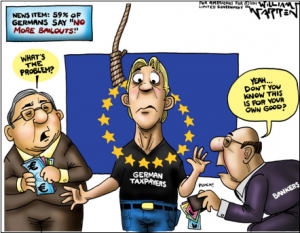
The proposal would allow the banks, which have run short on cash, to lend money right back to Spain to refinance and expand its €734.9 billion debt.
So, a bankrupt country that cannot afford to borrow from its insolvent banks then secures a loan on behalf of the banks, so it can lend itself back the money.
If that sounds just a little dopey to you, that’s because it should.
What will Spain do when the €100 billion European Financial Stability Facility (EFSF) loan comes due? Likely, borrow another €100 billion from somewhere else to refinance it, or else, like Greece, it will face at least a partial default on its other obligations.
But this type of arrangement is actually not uncommon at all. Such is the nature of modern government finance. It is an ever-revolving carousel where banks never have quite enough money to lend to their host governments, eventually reach their limits, and generally require a credit expansion — usually from the central bank — to continue the Ponzi scheme.
In the case of the U.S., credit expansion was used to finance World War II and other conflicts. It has been used to bankroll the ever expanding welfare state. But today it is clearly on an unsustainable trajectory. It was used to facilitate the housing bubble that eventually brought the economy to its knees when the mortgage debts went bad.
In Europe, however, the Eurozone would not have come into being without limitations on the ability of governments to monetize their debts. The Maastricht Treaty that established the Euro set criteria so member states would not run deficits larger than 3 percent of their respective economies. This was demanded by Germany in particular, aware of its own experience with hyperinflation under the Weimar Republic that directly led to the rise of the Nazis and World War II.
Since 2008, Spain, Greece, and others have blatantly flouted the rules, which are now testing the Euro’s capacity to continue existing in its present form. In 2011, Spain ran a deficit of 8.5 percent of its Gross Domestic Product, or €91.3 billion. Greece’s €19.5 billion deficit was 9.1 percent of its GDP, all in excess of what was ever allowed.
Now, these countries have demanded bailouts to finance the level of government they desire. Banks want the bailouts, too, since they were the ones that originally made the loans. And in truth, should Europe shed its prohibition on monetizing its own debt, the banking cartel would stand to make even more money. After all, the greater the debts governments amass, the greater the interest payments to the financial institutions that own that debt.
The real question fundamentally boils down to Europe’s — and Germany’s — comfort level with monetizing the debts of its irresponsible neighbors. Does Berlin wish to import the inflation of Athens, Madrid, and perhaps Rome, just to keep the Euro alive? Or would it be better to just let the experiment fail, even if the financial fallout is fierce?
Thus far, the story of the bailouts is that Germany has moved half-heartedly in the direction of debt monetization (i.e. printing money to refinance and expand Euro members’ debts) by the European Central Bank (ECB).
If, in the end, Berlin wishes to preserve the currency bloc in its current form, it might insist that the rules be followed by Spain, Greece and others, that deficits be reduced to no more than 3 percent of GDP. It can work out temporary arrangements to set them on that sustainable path, such as it has with the attempted bailout programs.
There is a point, however, where they must consider if the rules will ever be followed.
If not, then Europe’s financial system will continue to lack the resources to continue lending to governments wishing to spend beyond their means. The current stopgap measures will fail.
At that point, Germany will have a choice. It can then order the ECB and the Bundesbank to fire up its printing presses, capitulating on its prior stance and agreeing to monetize the debts of its neighbors — and in the process assuming those debts as its own.
Or it could simply cut off central bank support for those peripheral countries, effectively forcing them out of the Euro, and weathering the ensuing defaults.
There really is no middle ground about it. The Eurozone in its current form does not have the capacity to bankroll profligate socialist governments like Spain and Greece with unlimited financing to spend as much as they please. The contagion is spreading.
And if Germany does not want any part of financing the excesses of its spendthrift neighbors — and in invariably administering to contagion to itself — then it needs to bring a swift and orderly end to the failed Euro experiment before it is in over its head, and then Berlin needs a bailout, too.
Bill Wilson is the President of Americans for Limited Government. You can follow Bill on Twitter at @BillWilsonALG.







